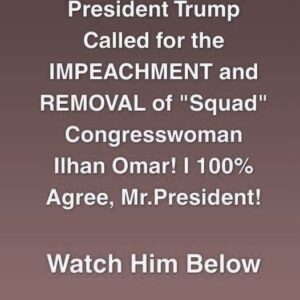President Donald Trump won a big case at the Supreme Court, getting support from justices who are usually liberal.
The court threw out a lower court order that was stopping the president from taking away the protected legal status of hundreds of thousands of migrants who are now living in the United States.
The decision was 8–1 in favor of the president’s stance. The only person who disagreed was Justice Ketanji Brown Jackson, who was chosen by former President Joe Biden.
The ruling makes it easier for the Trump administration to take away Temporary Protected Status (TPS) from about 300,000 Venezuelan migrants living in the U.S. and allows the administration to start deporting these migrants right away, according to the administration’s lawyers.
Last month, U.S. Solicitor General John Sauer told the Supreme Court that the lower court had gone beyond its authority.
He said that “the district court’s reasoning is untenable,” and that the program “involves particularly discretionary, sensitive, and foreign-policy-laden judgments of the Executive Branch concerning immigration policy.”
Kristi Noem, the Secretary of the Department of Homeland Security, sent out a memo in February saying that Temporary Protected Status would end in April.
On October 3, 2023, Venezuela was once again given transitory Protected Status (TPS) because of unusual and transitory situations that make it unsafe for Venezuelans to return home. The Secretary of Homeland Security has decided that Venezuela no longer meets the requirements for the 2023 designation after looking at the current circumstances in the country and talking to the appropriate U.S. government agencies. It has been decided that it is not in the best interest of the country to let the designated Venezuelan nationals stay in the United States for a short time. The document said, “As a result, Venezuela’s TPS designation for 2023 is being taken away.”
On March 9, 2021, Secretary of Homeland Security Alejandro Mayorkas gave Venezuela Temporary Protected Status (TPS) because he thought the “extraordinary and temporary conditions” there made it unsafe for Venezuelans to return home. He said that letting these people stay in the U.S. temporarily was in the best interests of the U.S.
The memo said, “On September 8, 2022, former Secretary Mayorkas extended the Venezuela 2021 TPS designation for 18 months.” On October 3, 2023, Secretary Mayorkas extended the Venezuela 2021 TPS designation for another 18 months, until September 10, 2025. He also gave Venezuela a new designation for 18 months, which the former Secretary called a “redesignation” (Venezuela 2023 designation). This designation will end on April 2, 2025, creating two separate and ongoing Venezuela TPS designations. Look at the Extension and Redesignation of Venezuela for Temporary Protected Status.
Secretary Mayorkas said on January 17, 2025, that Venezuela’s TPS status will be extended for another 18 months, until 2023. The notice was sent out because Secretary Mayorkas thought on January 10, 2025, that the criteria for the designation were still being met. See INA 244(b)(3)(A), (C), and 8 U.S.C. 1254a(b)(3)(A), (C). In the January 2025 declaration, Secretary Mayorkas did not say that the 2021 designation for Venezuela would be prolonged or ended. The DHS letter says that the news made it easier for filing procedures to come together. This meant that all eligible Venezuelan TPS beneficiaries, no matter if they were designated in 2021 or 2023, could acquire TPS by the single extension date of October 2, 2026.
Kristi Noem, the Secretary of Homeland Security, canceled the decision made by former Secretary Mayorkas on January 10, 2025, on January 28, 2025. This brought back the old status quo.
In March, U.S. District Judge Edward Chen of the Northern District of California put a stop to Noem’s plan because it portrayed immigrants as possible criminals in a way that was “unfounded and full of racism.”





